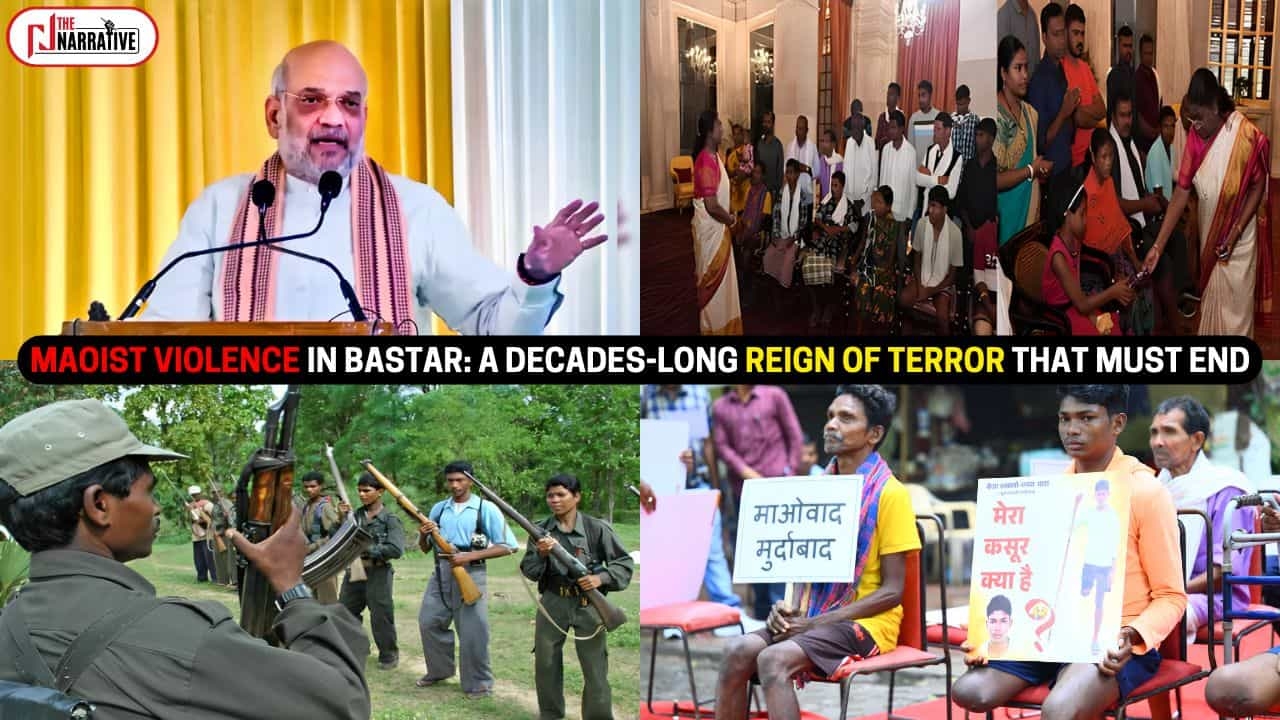Maoist Violence in Bastar: A Decades-Long Reign of Terror That Must End
From indiscriminate killings to the use of improvised explosive devices (IEDs), the Maoists have repeatedly demonstrated their disregard for the lives of local tribals, the very people they claim to represent.
Total Views |

The persistent reign of Maoist violence in Bastar, Chhattisgarh, has claimed the lives of over 1,800 civilians, most of them innocent tribals, in the past 24 years.
This tragic toll was brought to the forefront when a group of 55 victims of Maoist violence, under the banner of the Bastar Shanti Samiti, staged a silent protest in New Delhi.
These victims, many of whom have lost loved ones or suffered permanent disabilities due to the Maoist terrorism, later met with Union Home Minister Amit Shah and President Droupadi Murmu, advocating for stronger action against Maoists.
The victims, who had been flown to Delhi as part of a government initiative, shared their harrowing stories of how Maoist brutality has shattered their lives.
From indiscriminate killings to the use of improvised explosive devices (IEDs), the Maoists have repeatedly demonstrated their disregard for the lives of local tribals, the very people they claim to represent.
The cold, hard truth lies in the numbers: more civilians have perished in Maoist attacks than security forces. Bastar police data reveals that 1,833 civilians were killed between 2000 and 2024, compared to 1,292 security personnel.
The deadliest year was 2007, when 200 jawans and 168 civilians were killed, closely followed by 2010, which saw the infamous Chintalnar massacre in Sukma, where 76 security personnel lost their lives.
For the tribal communities of Bastar, these numbers are not just statistics; they represent families torn apart by Maoist violence.
One of the protesters, 22-year-old Madvi Nanda from Bijapur, lost his leg in an IED explosion. "I am just one among thousands who have suffered due to Maoist violence. We demand justice, rehabilitation, and an end to this cycle of terror," he said.
During their meeting with Home Minister Amit Shah, the victims demanded stronger security measures and a more aggressive stance against the Maoists.
Shah, while addressing the delegation, assured them that the Modi government was committed to eradicating Naxalism by March 31, 2026. "We will not rest until this menace is completely wiped out. Those who continue to indulge in violence will face the full force of the law," Shah stated emphatically.
The meeting also focused on the urgent need for rehabilitation and development in Maoist-affected areas. Shah promised a comprehensive welfare scheme that would provide jobs, healthcare, and other essential services to those affected by Maoist violence.
This aligns with the government's broader strategy of combining military action with socio-economic development to weaken the Maoist terrorism.
President Droupadi Murmu, who also met with the delegation, echoed similar sentiments, emphasising the importance of peace and development in the region.
"Your voices must be heard, and your struggles should inspire action at the national level," she said, encouraging the victims to continue their advocacy for a violence-free Bastar.
However, as the victims highlighted during their protest at Jantar Mantar, there remains a deep sense of betrayal among the tribal communities.
"Maoists claim to fight for our rights, for our land and our forests, but they have only brought misery," said Jairam Das, a member of the Bastar Shanti Samiti.
The protesters slammed human rights groups for turning a blind eye to the atrocities committed by the Maoists, accusing them of double standards.
"Where are the voices for those of us who have lost our limbs, our families, and our livelihoods? Why do these groups only speak up when Maoists are killed, but remain silent when we suffer?" asked one of the victims.
The Maoists’ so-called fight for tribal rights has been exposed as nothing more than a facade for violence and control.
Over the years, they have consistently targeted anyone they deem a threat—whether security forces, political leaders, or innocent villagers.
The Maoists' "Safaiya Abhiyan" (cleansing campaign) has led to the murder of countless civilians branded as informers. Even children have not been spared, with IEDs planted indiscriminately in villages, claiming young lives.
The tribal victims of Maoist violence have made it clear that they will not rest until justice is served and peace is restored to their homeland.
With the government now fully committed to eliminating the Maoist threat, there is hope that Bastar's long nightmare may finally be coming to an end.
But as the victims pointed out during their protest, the fight is far from over. The scars left by decades of Maoist violence will take years to heal, and the path to peace is fraught with challenges.
For the tribals of Bastar, the future hinges on one simple demand: the end of Maoist violence, once and for all.
Article by
Shomen Chandra
Sub Editor, The Narrative


